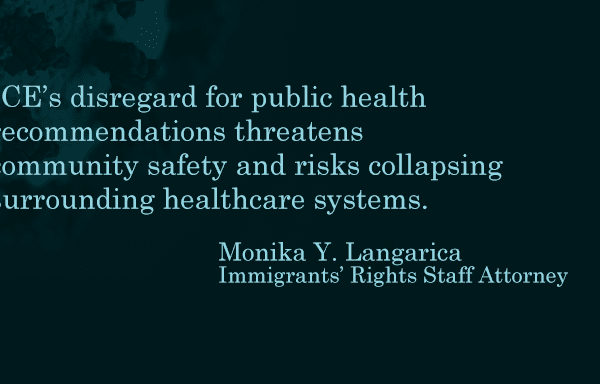SAN DIEGO – Today, the American Civil Liberties Union Foundation of San Diego & Imperial Counties (ACLUF-SDIC) filed a class-action lawsuit in U.S. District Court to demand a drastic reduction in the number of detainees at the Otay Mesa Detention Center and the Imperial Regional Detention Facility during the COVID-19 pandemic. The lawsuit also seeks an emergency temporary restraining order calling for the immediate release from Otay Mesa of all people age 45 and over, and people with underlying medical conditions that place them at heightened risk of serious illness or death due to COVID-19.
Otay Mesa is the site of the largest outbreak of COVID-19 of any U.S. Immigration and Customs Enforcement (ICE) detention center nationwide, with 27 detainees and at least 18 staff confirmed positive as of April 17. ICE has ignored the warnings of even its own medical experts, who for months have been cautioning against the perils to public health if the agency fails to take meaningful preventative measures. Recently, ICE leadership admitted to Congress it was no longer considering releasing people from its custody due to the threat of COVID-19 because doing so would send the wrong message about enforcement priorities.
“ICE is knowingly jeopardizing the lives of people in its custody by refusing to take action to mitigate the outbreak of COVID-19 at Otay Mesa and prevent the introduction of the virus at Imperial,” said Monika Y. Langarica, immigrants’ rights staff attorney at ACLUF-SDIC. “ICE’s disregard for public health recommendations threatens community safety and risks collapsing surrounding healthcare systems.”
The lawsuit argues immediate court intervention is necessary to mitigate the outbreak, save lives, and preserve public health.
Medical authorities have emphatically stated that maintaining a social distance of at least six feet is crucial to preventing the spread of COVID-19. But conditions at Otay Mesa and Imperial, where hundreds of people are incarcerated, make social distancing impossible.
The lead plaintiffs in the case include a Cuban couple, a 19-year old Guatemalan woman who has been separated from her younger brother for ten months, and a Honduran woman who has been separated from her husband for nearly four months. One plaintiff is diagnosed with HIV and another has severe asthma. All are threatened by conditions at the detention centers that make it impossible to take the steps necessary to protect their health and safety in custody.
Among the conditions at the centers:
- Cells are populated by up to eight people at once with bunk beds fewer than six feet apart.
- Detainees share sinks, toilets, telephones and showers, with no disinfectant cleaner available for after use.
- Soap runs out frequently and refills are inconsistent, forcing detainees who cannot afford to buy soap to go without it.
- Mealtime is communal, with detainees forced to line up closely to receive their meals and choose between eating at overcrowded tables or in their cells, close to other detainees and toilets.
Putting people imprisoned at the Otay Mesa and Imperial detention centers at such heightened risk of exposure to the virus is not only inhumane, it also violates the Fifth Amendment of the U.S. Constitution, which forbids the government from confining people under conditions that unreasonably risk their health and safety.
In addition to the immediate release of medically vulnerable Otay Mesa detainees, the court filing proposes a system for reducing the detention centers’ population, beginning with the most vulnerable detainees, through the orderly release of people to their networks of care, where they can self-quarantine and practice social distancing.
Read the lawsuit here.
###
Stay Informed
Sign up to be the first to hear about how to take action.
By completing this form, I agree to receive occasional emails per the terms of the ACLU’s privacy statement.
By completing this form, I agree to receive occasional emails per the terms of the ACLU’s privacy statement.

